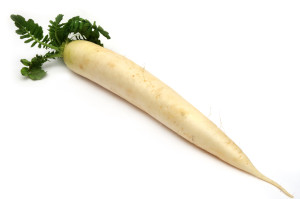Daikon (大根, literally “big root”), also known by many other names depending on context, is a mild-flavored winter radish (Raphanus sativus) usually characterized by fast-growing leaves and a long white napiform root. Originally native to Southeast or continental East Asia,[8] daikon is harvested and consumed throughout the region (as well as in South Asia) but is primarily grown in North America as a fallow crop, with the roots left unharvested to prevent soil compaction and the leaves (if harvested) used as animal fodder
Contents
Uses
- In Japanese cuisine, many types of pickles are made with daikon, including takuan and bettarazuke. Daikon is also frequently used grated and mixed into ponzu, a soy sauce and citrus juice condiment. Simmered dishes are also popular such as oden. Daikon that has been shredded and dried (a common method of preserving food in Japan) is called kiriboshi-daikon (literally, “cut-dried daikon”). Daikon radish sprouts (kaiware-daikon) are used for salad or garnishing sashimi. Daikon leaf is frequently eaten as a green vegetable. Pickling and stir frying are common. The daikon leaf is part of the Festival of Seven Herbs, called suzushiro. In Chinese cuisine, turnip cake and chai tow kway are made with daikon. The variety called mooli has a high water content, and some cookbooks recommend salting and draining it before it is cooked. Sometimes mooli is used to carve elaborate garnishes.
- In Korean cuisine, a variety is used to make kkakdugi, nabak kimchi and muguk soup. The younger version of the radish is used with the leaves in chonggak kimchi. This variety of daikon is shorter, stouter, and has a pale green color extending from the top, to approximately halfway down the tuber. The flesh is denser than the Japanese variety and the leaves are smooth in texture which makes them better for pickling. The leaves of a mature plant are often too tough to be eaten raw, and so are shade dried to be used in soups, or boiled and seasoned into potherbs
Benefits
Cancer Prevention
Daikon is one of many cruciferous vegetables linked in studies with successful cancer prevention. Daikon contains several great antioxidants associated with fighting free radical damage, a known cause of cancer. Research has also shown that daikon juice helps prevent the formation of dangerous chemicals and carcinogens inside the body and helps the liver process toxins.
High In Vitamin C
Vitamin C is a powerful antioxidant that not only combats free radical activity in the body but also offers great immune system support and helps prevent illness such as the common cold. 100 grams of daikon provides 34% the DV of vitamin C. Daikon leaves have a much higher concentration of vitamin C than that of daikon roots.
Antibacterial & Antiviral
Daikon appears to be able to combat bacterial and viral infections.
Anti-Inflammatory
Research suggests that high levels of vitamin C and B, such as found in daikon, help to prevent chronic inflammation in the body which can lead to problems such as arthritis and heart disease.
Digestive Aid
Raw daikon juice is abundant with human digestive enzymes that help the body process proteins, oil, fat and carbohydrates.
Diuretic
Daikon helps the kidneys discharge excess water. A natural diuretic, it may also be helpful in treating urinary disorders.
Respiratory Health
Raw daikon juice may help dissolve mucus and phlegm and aid in the healthy function of the respiratory system. Its ability to combat bacteria and viral infections may make it an effective combatant of respiratory disease such as bronchitis, asthma and flu.
Skin Health
Applied topically or ingested, daikon juice has proven effective in preventing and treating acne and other skin conditions.
Bone Health
Daikon leaves are an excellent source of calcium, which helps promote healthy bone growth and may lower the risk of osteoporosis.
Weight Loss
In Asia, it is believed that daikon helps the body to burn fat, though this has not been proven. Whether it helps burn fat or not, daikon radish is extremely low in fat and cholesterol, but dense with nutrients, making it a great addition to any effective weight loss program.
Cautions
- Some evidence has been suggested that daikon and other radish varieties shouldn’t be eaten by people with gallstones. Other than that, daikon is not commonly known as an allergen and is generally considered healthy for anyone.
Interactions
- Please consult your nutritionist
Other names
Radish, Latin name Raphanus Sativus
References
Source: Wikipedia, https://en.wikipedia.org/wiki/Daikon#Culinary_use
Healthdiaries, http://www.healthdiaries.com/eatthis/10-health-benefits-of-daikon-radish.html
Organic Facts, https://www.organicfacts.net/health-benefits/vegetable/daikon.html

